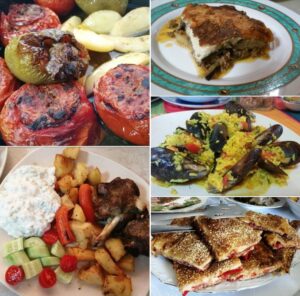Image credit to Festivalaki Cretan festival of Arts & Culture
Hi All! Thrilled to share today the Greek tradition of the lucky plant for the New Year! I’ll also share my recipe for Vasilopita, the cake with the hidden coin inside that Greek families traditionally cut together on New Year’s Eve.
The big day is approaching and, soon, the Greeks will be looking to buy an unedible little plant that looks very much like an onion but is not. You’ll find it in the stores here only once a year, folks. Do you know what they are for? Fret not, for I am about to tell you 🙂
These special plants to the Greeks decorate people’s front doors for good luck every year, and are put in place in time for New Year’s Day.
My parents have always referred to this plant simply as ‘riza’, which is just the Greek word for ‘root’. My father described it as some kind of wild onion, because of the shape of the root. Years later, when I looked up this plant online, I realised my father’s description was bang on!
As my Internet search revealed, the plant has many names: Agriokremmydo (wild onion), Skylokremmydo, Skylla, Askeletoura, Boska, and Agiovasilitsa. The latter refers to Agios Vasilis, the Greek Santa Claus, and that makes sense as the plant is used in the New Year, when Agios Vasilis makes His visit to the children, according to Greek custom.
The Latin name of the plant is Urginea. Apparently, it is the plant of Pan (the pagan god of nature in ancient Greece). It was believed to offer fertility, good luck, and good fortune.
The custom of hanging these roots outside homes in the new year is largely followed on the island of Crete. It seems to be followed in Athens too, though not by many. In general, I don’t see them outside people’s houses that often these days any more.
Anyway, my family never had to buy one, since urginea grows all over the open fields here every winter, and even on our local beaches, as you can see in this picture.
Close to New Year’s Eve, even at the age of 80, my late father would go up the road to the first open field and dig up two of these plants, taking great care to remove the root whole and intact. He’d then hand over one plant to my husband and me, the onion-like root covered in aluminium foil. All I had to do then was to tie a piece of string around its stem and my lucky plant was ready to hang at the gate.
Whatever your customs or personal family traditions are for New Year’s Eve in your part of he world, have lots of fun, and a happy and peaceful 2025!
Here’s another Greek tradition – Vassilopita – the New Year’s Eve cake with the hidden coin inside. Learn all about it here and get my family recipe!
Can you say ‘Melomakarona’? Or even know what it is?
Check out the traditional Greek Christmas desserts here, and a fun cookie recipe that the kids will love to bake! Enjoy!
Sharing is caring! Here’s a ready tweet for you to spread some love:
Interested in travel, food and books from Greece? Here's a blog you will love! #Greeklife #blogger #author Share on X
3 FREE books for you! Sign up below to receive them instantly!
NEW! Clean Christmas romance. Single mother Cathy Roussos gave up on love long ago, and veterinarian Alex Rallis doesn’t believe in it, but one magical Christmas on a Santorini farm might just change everything…
Check it out on Amazon Read a FREE sample!
A clean romantic suspense short read with an unreliable narrator that’ll keep you guessing! Vera is losing her mind over famous actor Yannnis Ksenos, except, she isn’t just a fan… Now, she plucks up the courage to ring his doorbell… Visit Amazon










